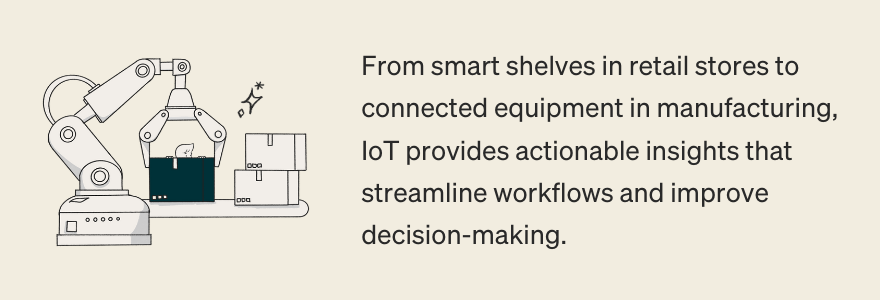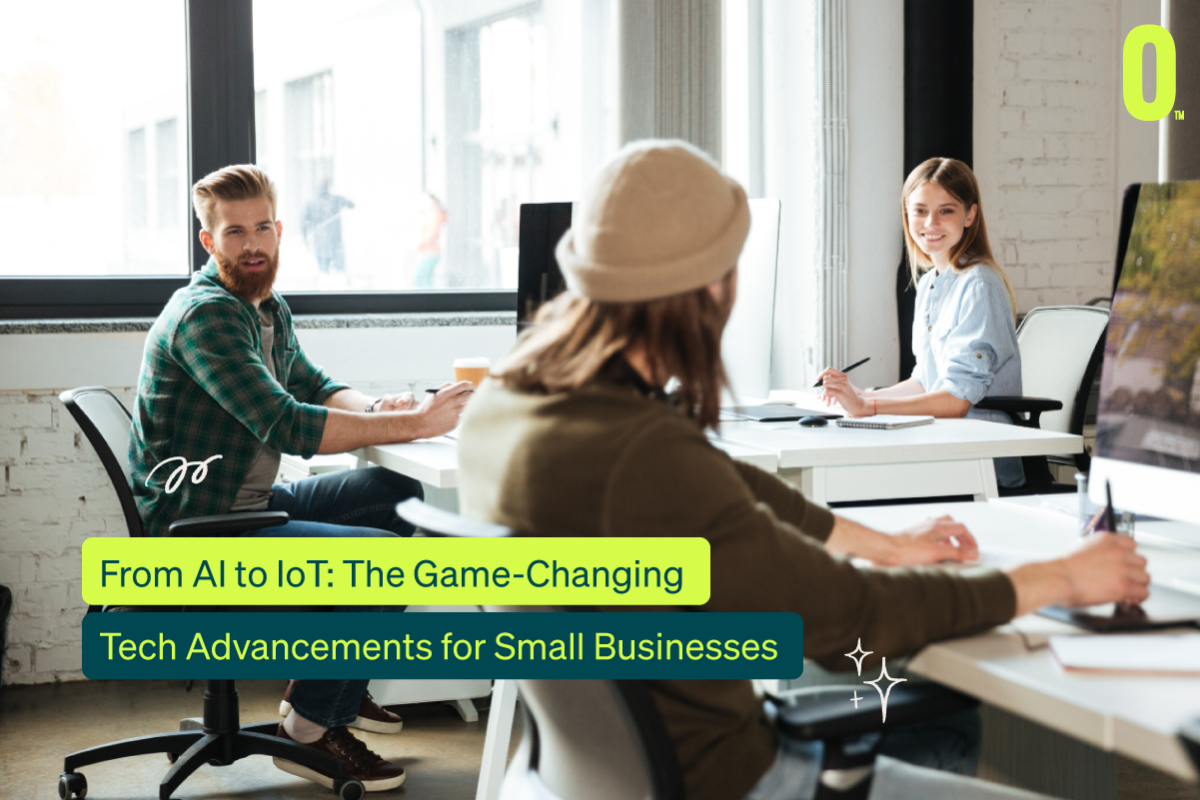The rapid pace of technological advancements is reshaping industries worldwide, and small businesses must adapt to stay competitive. From improving operational efficiency to enhancing customer experiences, emerging technologies provide opportunities for businesses across sectors to grow, innovate, and thrive.
Here, we explore the tech advancements most likely to impact small businesses in the coming years, with examples tailored to industries such as manufacturing, hospitality, finance, retail, e-commerce, local government, not-for-profits, legal, and education.
1. Artificial Intelligence (AI) and Machine Learning
Artificial intelligence (AI) and machine learning are transforming how small businesses operate, providing cost-effective tools for automation, analytics, and customer engagement.
Once considered advanced technology for enterprises, AI is now accessible to businesses of all sizes, enabling smarter decision-making, personalisation, and process optimisation. AI applications are helping industries like manufacturing predict equipment failures, aiding finance in fraud detection, and empowering retail with tailored marketing.
From chatbots to dynamic pricing, AI continues to reshape how businesses interact with their customers.
E-Commerce: AI-driven tools can dynamically adjust pricing based on demand and competitor analysis.
Healthcare: Small clinics can use AI to schedule appointments and predict patient flow to optimise resources.
Real Estate: AI tools help real estate agents identify ideal properties for clients by analysing trends and preferences.

2. Internet of Things (IoT)
The Internet of Things (IoT) is revolutionising small businesses by connecting physical devices to the internet for real-time data collection and automation. IoT enables smarter operations, cost savings, and improved customer experiences.
From smart shelves in retail stores to connected equipment in manufacturing, IoT provides actionable insights that streamline workflows and improve decision-making. Businesses in local government and healthcare are using IoT to monitor infrastructure and patient conditions, while restaurants optimise supply chains with IoT sensors.
Agriculture: IoT-connected sensors help farms monitor soil moisture, monitor livestock, and optimise irrigation.
Transportation: Small logistics firms use IoT for real-time tracking of deliveries.
Hospitality: Hotels use IoT-enabled devices for automated room temperature and lighting controls.
3. Cloud Computing
Cloud computing has transformed the technology landscape for small businesses, providing access to enterprise-grade IT solutions without the need for costly infrastructure.
Cloud services enable data storage, collaboration, and scalability while offering flexibility for remote work and rapid deployment of applications. From education to not-for-profits, cloud computing supports a range of needs, such as virtual classrooms, online fundraising platforms, and secure document storage.
As hybrid work becomes the norm, small businesses increasingly rely on the cloud to stay competitive.
Retail: Cloud-based point-of-sale (POS) systems simplify inventory management and sales tracking.
Construction: Small firms use cloud tools for project management and resource allocation.
Healthcare: Cloud systems enable small clinics to securely manage patient records and telehealth services.
4. Cybersecurity Tools
Cybersecurity is a growing concern for small businesses as cyberattacks become increasingly sophisticated. Advanced cybersecurity tools, such as endpoint protection, multi-factor authentication, and AI-driven monitoring, are now essential for safeguarding sensitive data.
From protecting financial records to ensuring secure online transactions and keeping consumer data safe, these tools are critical for industries like retail, education, and finance. Cybersecurity solutions not only defend against threats but also help businesses meet compliance requirements and build trust with customers in an era of increasing digital vulnerabilities.
Not-for-Profits: Secure donation platforms protect donor information.
Hospitality: Hotels use cybersecurity tools to safeguard guest information and booking systems.
Media: Local publishers rely on cybersecurity to protect intellectual property and subscriber databases.
5. Automation Technologies
Automation is empowering small businesses to streamline operations, reduce errors, and scale efficiently.
By automating repetitive tasks, businesses can free up resources to focus on growth and customer engagement. Automation technologies are being adopted across industries, from e-commerce businesses deploying automated email campaigns to manufacturing plants utilising robotic process automation.
Retailers are enhancing customer experiences with self-checkout systems, and logistics companies are optimising delivery routes. Automation is proving to be a valuable asset for improving productivity and reducing operational costs.
Marketing Agencies: Automated analytics tools streamline campaign performance tracking and reporting.
Education: Automated grading systems reduce workload for teachers and increase efficiency.
Finance: Robotic process automation (RPA) automates payroll and tax filing processes.

6. Blockchain Technology
Blockchain is redefining how small businesses manage transactions, supply chains, and digital security. With its decentralised and tamper-proof nature, blockchain provides transparency and trust for industries like manufacturing, legal, and finance.
Small manufacturers are using blockchain to authenticate product origins, while law firms utilise smart contracts to reduce paperwork. For finance, blockchain streamlines cross-border payments and improves security.
Beyond transactions, blockchain is creating new opportunities in identity verification, digital certificates, and secure voting systems for small organisations.
Retail: Blockchain ensures the authenticity of luxury goods through transparent supply chains.
Healthcare: Small clinics use blockchain for secure patient record-sharing across providers.
Education: Blockchain-based digital diplomas prevent credential fraud and simplify verification.
7. Augmented Reality (AR) and Virtual Reality (VR)
Augmented reality (AR) and virtual reality (VR) are revolutionising customer engagement and training across industries. These technologies create immersive experiences that captivate customers and streamline employee learning.
From virtual fitting rooms in retail to VR simulations for employee training in manufacturing, AR and VR offer endless possibilities. Not-for-profits are using AR to bring campaigns to life, while educators are using VR to make complex concepts more accessible. Small businesses leveraging AR/VR stand out with innovative and memorable user experiences.
Real Estate: VR tours allow potential buyers to explore properties remotely.
Tourism: AR apps provide virtual guides for cultural and historical landmarks.
Healthcare: VR simulations train healthcare workers in complex procedures.
8. Hybrid Cloud Strategies
Hybrid cloud strategies are helping small businesses balance flexibility, scalability, and security by combining public and private cloud resources. These models allow businesses to optimise workloads, storing sensitive data securely while leveraging public cloud efficiency for less critical operations.
Industries like legal, finance, and local government are benefiting from hybrid cloud setups for secure storage and streamlined collaboration. As digital transformation accelerates, hybrid clouds are becoming essential for businesses seeking to modernise infrastructure without compromising control or security.
Healthcare: Hybrid clouds enable secure telehealth services alongside traditional patient management.
Retail: Seasonal sales surges are managed effectively using hybrid cloud resources.
Education: Institutions use hybrid models for on-campus and remote learning integration.
9. Data Analytics and Business Intelligence
Data analytics and business intelligence tools empower small businesses to make informed decisions and identify growth opportunities. By analysing customer behaviour, sales trends, and operational data, businesses can optimise strategies and improve performance.
Industries like e-commerce and retail use analytics for targeted marketing and inventory management, while education uses it to personalise learning experiences.
Small businesses that embrace data-driven insights gain a competitive edge by identifying trends early, optimising resources, and delivering tailored customer experiences.
Legal: Analytics tools forecast case outcomes based on historical data.
Not-for-Profits: Donor analytics help optimise fundraising efforts.
Manufacturing: Predictive analytics improve production scheduling and resource allocation.
10. Remote Work and Collaboration Tools
Remote and hybrid work has become a staple for businesses across industries, making collaboration tools essential for seamless operations. Platforms like Microsoft Teams, Slack, and Zoom enable small businesses to communicate effectively, manage projects, and collaborate in real time.
These tools are particularly impactful for industries like education, legal, and finance, where virtual interactions are key. Whether hosting online classes, conducting virtual client meetings, or managing dispersed teams, small businesses rely on these tools to stay connected and productive.
Creative Agencies: Collaborative design platforms streamline remote brainstorming sessions.
Healthcare: Remote collaboration tools enhance coordination between specialists and general practitioners.
Finance: Virtual meeting tools simplify consultations with remote clients.
11. Energy-Efficient Technologies
Energy-efficient technologies are helping small businesses reduce costs while meeting sustainability goals. From smart energy management systems to low-power computing devices, these innovations are becoming vital across industries.
Retailers are adopting smart thermostats and lighting systems, while manufacturers invest in energy-efficient machinery. Not-for-profits are reducing their carbon footprint by using renewable energy sources and eco-friendly practices.
Small businesses that embrace energy efficiency not only save money but also enhance their reputation among environmentally conscious customers and stakeholders.
Hospitality: Hotels use energy-efficient HVAC systems to reduce energy consumption.
Agriculture: Solar-powered irrigation systems reduce operational costs for small farms.
Education: Schools adopt energy-efficient lighting and heating solutions to lower utility bills.
12. Artificial General Intelligence (AGI)
Artificial General Intelligence (AGI), though still in its infancy, has the potential to transform industries by mimicking human intelligence and creativity.
AGI systems could revolutionise sectors like education with adaptive learning platforms, finance with real-time portfolio management, and healthcare with unparalleled diagnostic capabilities. While widespread implementation is years away, small businesses must stay informed about AGI’s development and prepare for its integration.
AGI offers exciting possibilities for automation, innovation, and problem-solving that could reshape how businesses operate.
Manufacturing: AGI optimises production lines by autonomously identifying inefficiencies.
Retail: AGI-powered systems anticipate customer needs and provide hyper-personalised recommendations.
Creative Industries: AGI generates design concepts and creative content tailored to client specifications.
Prepare for the Future with Melbourne’s Leading MSP
Technological advancements are reshaping the landscape for small businesses across industries. From AI-powered automation to immersive AR experiences and robust cybersecurity tools, these innovations offer unparalleled opportunities for growth and efficiency. However, they also require strategic adoption, investment, and training to realise their full potential.
By staying informed and embracing these advancements, small businesses in manufacturing, finance, retail, e-commerce, local government, not-for-profits, legal, and education can not only keep pace with change but also drive meaningful innovation in their sectors. The future is bright for those who adapt today.
At Otto, our ISO27001 certified MSP in Melbourne, we work with your tech staff and leadership to develop customised roadmaps for your budget and sector, setting you up and supporting you with the best tech to deliver the results that matter most. We’ll also ensure that your AI tools and cloud solutions offer the best in cybersecurity, ensuring they don’t put your organisation at risk. In addition to creating and deploying AI technologies, we can supplement your tech department or run it ourselves, supply you with vCIO and consulting services, deliver tech support, implement hybrid working solutions, and so much more.




